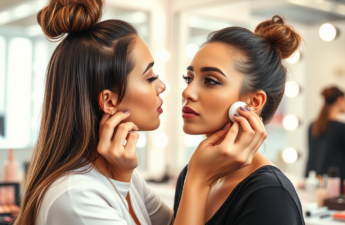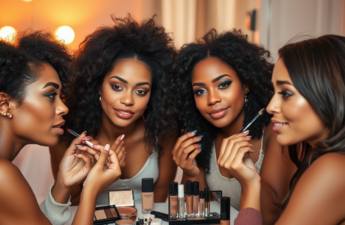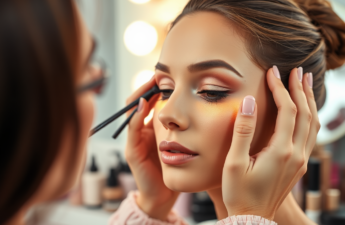Ever wondered if your make-up expires? The answer is yes, make-up does expire. Using expired cosmetics can lead to skin irritation and infections. This article will guide you through everything you need to know about cosmetic expiration dates.
What are Cosmetic Expiration Dates?

Cosmetic expiration dates indicate the duration for which the product is expected to remain safe and effective. These dates are set by manufacturers based on various factors like ingredients and packaging. Despite being a rough guideline, they are crucial for maintaining your skin’s health.
Many products come with a Period After Opening (PAO) symbol, which shows a number followed by the letter ‘M’, denoting the number of months a product is good after you’ve opened it. For instance, ‘12M’ means the product should be used within 12 months after opening.
Ignoring these expiration dates can lead to degraded product quality, affecting not only performance but also causing potential harm. Always keep in mind that expired make-up is a breeding ground for bacteria.
Why Do Make-Up Products Expire?
Make-up products expire for several reasons. Ingredients can break down over time, especially once exposed to air and bacteria. Natural ingredients may degrade faster than synthetic ones, leading to a shorter shelf life.
Moreover, the packaging plays a significant role in a product’s longevity. Products in airtight containers often last longer than those in jars or open-topped containers. Oxygen can accelerate the breakdown of the formula, making it less effective over time.
Another reason is the contamination caused by repeatedly dipping applicators into the product. This can introduce bacteria, which can multiply and potentially cause infections. Hence, proper handling and application are essential to extend the product’s usability.
Common Expiration Date Guidelines
Here are some general guidelines to help you navigate make-up expiration dates:
-
Mascara:
Replace every 3-6 months, as it is highly prone to bacterial contamination. -
Lipstick and Lip Gloss:
Good for about 1-2 years. Lip products can harbor bacteria, especially if shared. -
Foundation and Concealer:
Liquid forms last 6-12 months, while powder forms can last up to 2 years if stored properly. -
Powder Products (Eyeshadow, Blush, etc.):
Typically safe to use for up to 2 years, but can last longer if kept clean and dry. -
Eye and Lip Pencils:
These can last up to 2 years if sharpened regularly, which helps prevent contamination.
How to Tell if Your Make-Up Has Expired
Sometimes, it’s easier to notice expired make-up by observing changes in texture, color, or smell. For instance, if your foundation has separated into layers, or your mascara has a strong, unusual odor, it’s time to toss them out.
Another telltale sign is the product’s performance. If your make-up doesn’t apply smoothly or blend like it used to, it might have gone past its prime. Powders can become hard and less pigmented, while creams can become lumpy or dry.
Always keep an eye on the consistency and behavior of your make-up products. Additionally, keep track of when you opened a new product by noting the date on the packaging with a marker. This can help you remember when it’s time for a replacement.
Storing Make-Up Properly
Proper storage can significantly extend the life of your cosmetics. Store your make-up in a cool, dry place away from direct sunlight. High temperatures can cause the ingredients to break down faster, reducing the product’s effectiveness.
Ensure all lids are tightly closed to prevent air exposure and contamination. Refrain from storing make-up in the bathroom, where heat and humidity can hasten the expiration process. Instead, consider storing them in a dedicated drawer or cosmetic bag.
Also, regularly clean your applicators and brushes to prevent transferring bacteria to your products. A good rule of thumb is to wash your brushes at least once a week and sanitize other applicators regularly.
Conclusion
Understanding and adhering to make-up expiration dates is crucial for maintaining healthy skin. By following the guidelines and storage tips outlined in this article, you can ensure your cosmetics remain effective and safe to use. Always trust your senses and discard any products that show signs of degradation.
FAQs
Q: How can I find the expiration date of my make-up?
A: Check the product for a PAO symbol or look for an expiration date directly on the packaging. If in doubt, refer to the general guidelines mentioned above.
Q: Can using expired make-up harm my skin?
A: Yes, expired make-up can cause skin irritation, infections, and breakouts due to the growth of bacteria and the breakdown of ingredients.
Q: How should I store my make-up to extend its shelf life?
A: Store make-up in a cool, dry place away from direct sunlight and heat. Ensure lids are tightly closed, and avoid storing products in humid environments like the bathroom.
A: Sharing make-up is not recommended as it can transfer bacteria and increase the risk of infections. Always use clean, sanitized applicators if sharing is unavoidable.
Q: How often should I clean my make-up brushes and applicators?
A: Clean your make-up brushes at least once a week and sanitize other applicators regularly to prevent bacterial growth and maintain hygiene.



